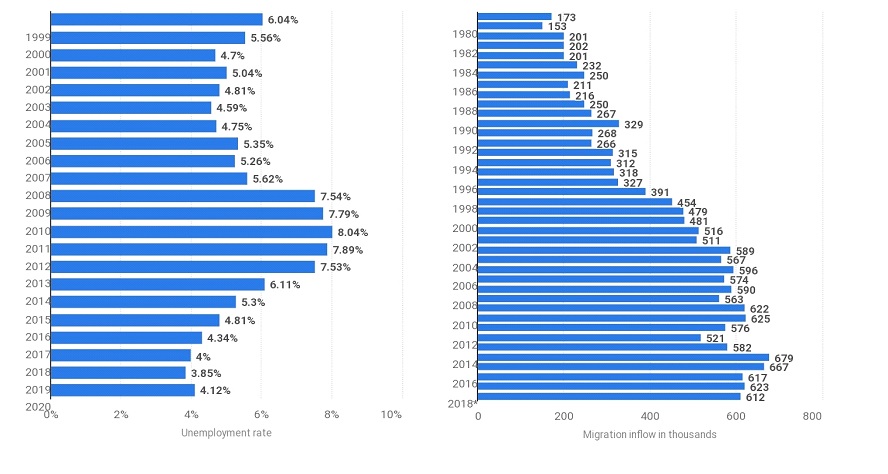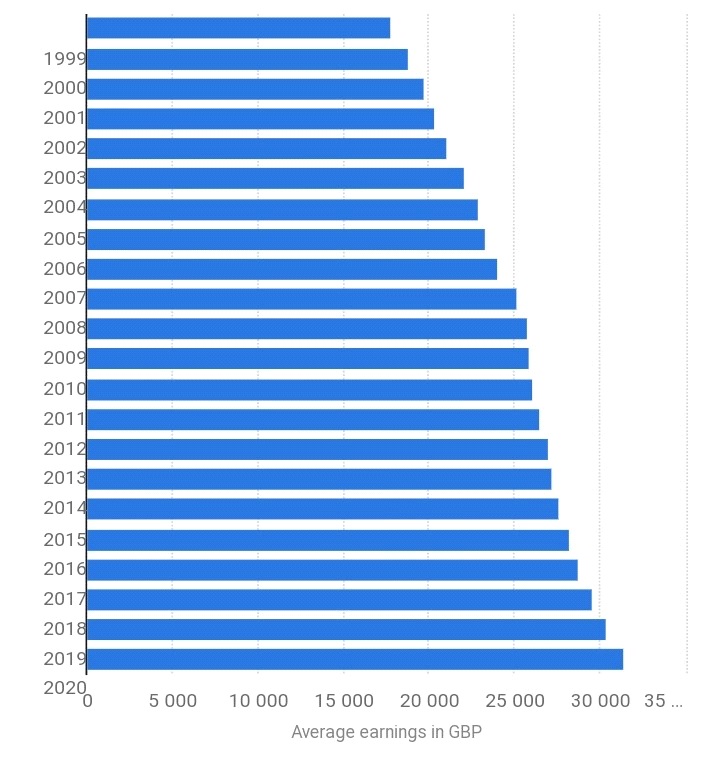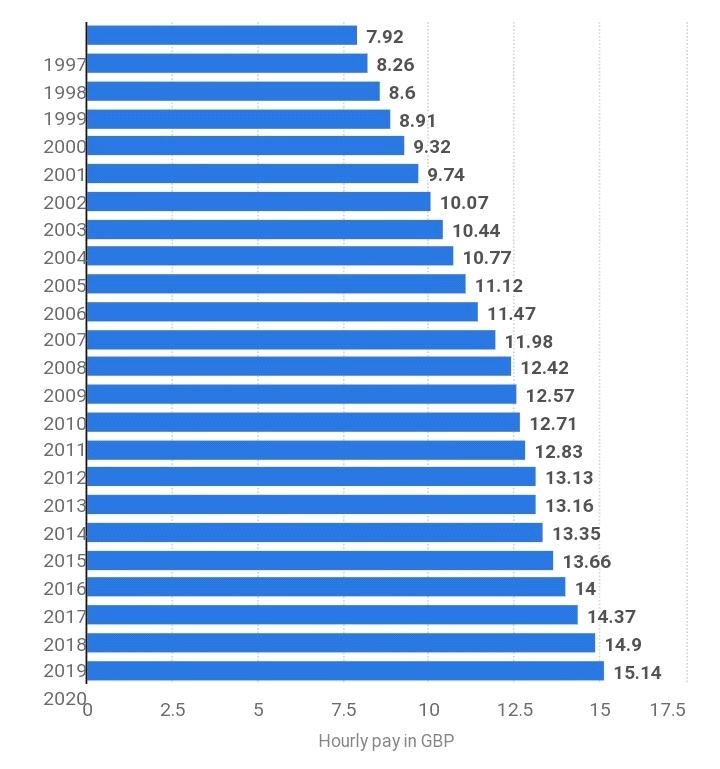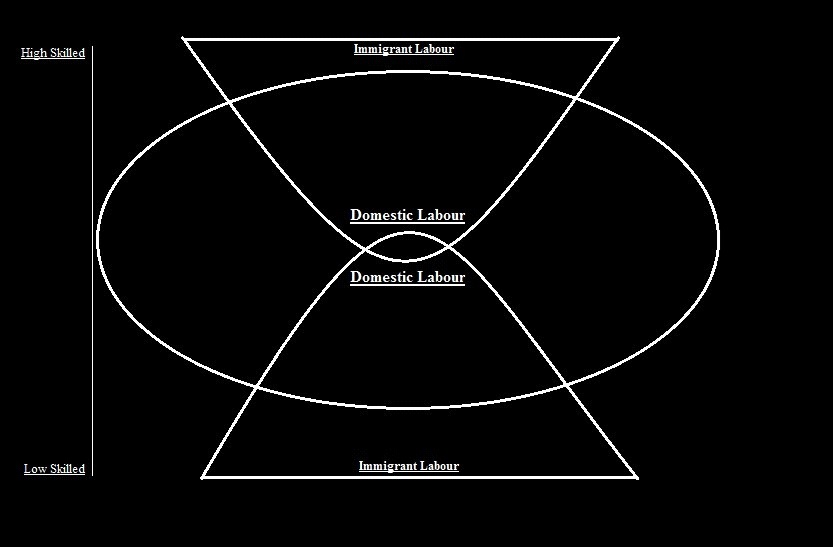
Image: https://pixabay.com/photos/migration-integration-migrants-3129340/

Economic Piece by Josh L. Ascough
Immigration is a contentious issue that has been in the spotlight for many years now, most notably due to Brexit and the question of what the U.K’s future relationship is when it comes to immigration. The Conservative Party and many others have opted for a points-based immigration system, the problem here is this gives the government central decision making about who is allowed to enter the country; further politicising migration and furthering command over the international labour market; which since the government makes the choices of what type of market they want to “create” and how they want to shape employment, it very much leaves immigration at the mercy of special interest groups; whether it be for protectionism, or nationalist tendencies.
“While I supported Brexit I was very saddened to see the free movement of people removed”
While I supported Brexit I was very saddened to see the free movement of people removed, and I truly believe if a more Liberal argument was the prominent voice for Brexit; rather than a Nationalist, Protectionist voice, then Brexit likely would’ve been accomplished within the first year of negotiations. The process would have gone along the lines of:
“We’ll make a compromise on free movement if you agree to free trade, but any attachment to the political and bureaucratic apparatus is off the table.”
Throughout this piece I’ll be going over two key misconceptions about immigration, followed by offering a brief analysis on what a better immigration system would be. These key areas are:
- Immigrants Steal Our Jobs.
- Immigrants Lower Wages.
“Modern Nationalism and collectivism have, by the restriction of migration, perhaps come nearest to the “servile state.”[…]Man can hardly be reduced more to a mere wheel in the clockwork of the national collectivist state than being deprived of his freedom to move[…]Feeling that he belongs now to his nation, body and soul, he will be more easily subdued to the obedient state serf which nationalist and collectivist governments demand.” ~ Wilhelm Ropke, Free Market Economist.
Immigrants Steal Our Jobs.
Probably one of the most famous, reactionary arguments towards immigration; so much so it’s become a famous line in South Park, this argument is usually based in two areas. The first being, the relationship between immigration and unemployment, and what Bastiat called “The Seen and The Unseen”.
Below are two statistical indicators of unemployment and rates of immigration to the U.K; the unemployment rates are from the periods of 1999 to 2019; the rate of immigration for the years 1980 to 2018.

As we can see from the data, there not only appears to be no causation towards unemployment from immigration, there’s not even a correlation.
Two interesting areas to take note of in the data is that the period of 2002 to 2004 had some of the lowest unemployment rates; ranging from 4.8% to 4.7%, and some of the highest levels of immigration of that decade, from 589,000 to 596,000. In addition the other area to take note of, is the only period where high unemployment was met with high levels of immigration; unemployment being at 7.5%, a peak of 8.04% and then back to around 7.5% between 2008 and 2012, and immigration levels between a high of 622,000 to 679,000 between 2008 and 2012. However, we should note that this period, was during and at the peak of the financial crisis of 2008.
If we go even further into the data we can see which demographics are hit most with unemployment, especially around the financial crisis.
Taking a look at the data below we can see that those hit hardest by general unemployment and the effects of the financial crisis, are those who are at the very marginal beginnings of their professional careers; those aged between 16 to 24 years of age.

Unemployment for those aged 16 to 24 is just below 25%. Now someone may look at this and conclude that, sure the financial crisis hurt young workers the most, but even outside that clearly immigration hurts young workers.
Except this ignores other variables.
These other variables to be taking into account include higher education and the minimum wage. Due to the taxpayer subsidising the money used for loans for student tuition fees, the filtering process of higher education has been eroded over time; alongside an increased promotion of University being a place for socialising rather than educating; more and more people acquiring University Degrees has led to an, “inflation” of higher education, meaning a degree is not as valuable as it once was to potential employers.
When it comes to the minimum wage it is pretty straight forward. If we have an increase in the minimum wage let’s say to £10 per hour, and a prospective employee is not able to produce at £10 per hour; suppose they can only produce at £8 per hour, they will find it excessively hard to enter the job market. That, or they will find the job they used to have has been cut and they’ve been laid off. In order for the potential employer to cover the cost of employing an individual at the newly increased minimum wage, they will be seeking past experience and higher levels of qualification; causing people to not be settled long term in the job market until they’ve reached their mid-20s to early-30s.
“it’s not immigration that has led to high unemployment among young people; it’s government intervention and regulation of education and employment”
So it’s not immigration that has led to high unemployment among young people; it’s government intervention and regulation of education and employment, which has led to young University students with a Degree only being able to find work at Primark; if they’re lucky.
The other aspect of the “they steal our jobs” fallacy has to do with what French Liberal Economist Fredric Bastiat called, ‘The Seen and Unseen’. As part of this fallacy I’ll also include the concept that immigration lowers wages.
When a new immigrant worker enters the job market, we see a supplied job that could have gone to a native worker becomes occupied. The old talking point being it’s simple supply and demand; if you increase the supply of labour, you get more jobs taken up and you see the price of labour lowered.
In the diagram shown below we see an example of the argument stated above. W0 = original wages before immigration, W1 = wages with increased supply, S0 = original supply, S1 = added supply, and D = demand.

There are a few problems with this argument however. The argument looks at it as ‘The‘ supply of labour and ‘The‘ demand for labour, as though the labour market is homogenous; that all labour is exactly the same with no degrees of different skills required, hours worked, tasks to be done etc; as if a member of the labour market who works at a warehouse moving heavy crates can be interchanged with a labourer who works on a construction site putting in drywall. This is incorrect, labour like other capital goods is heterogeneous.
The other problem with this argument, when it comes to the seen and unseen, is that immigrants have demands for goods and services that they value also. With immigration if the new residents also hold demand for goods and services that has seen an influx of new workers, then we do not see a long term drop in wages.
We can delve into this a bit deeper to get a better understanding:
Suppose ‘Group A’ work as delivery drivers for a company that produces shoes, and ‘Group B’ are the workers who produce the shoes. Let us then suppose ‘Group B’ receives an influx of immigrant workers; in the short term they see their wages decreased. However, because now, ceteris paribus, the shoes have become cheaper to produce, more consumers are able to buy said shoes at a lower price.
Now that more consumers are purchasing more shoes, there are more deliveries demanded for drivers. In this situation one of two things can happen: Either the company will increase the hours each driver works; thereby increasing their overall earnings due to working additional hours at the same rate, or the company will look for qualified workers to hire as additional delivery drivers; the drivers won’t see their earnings increase due to no increase in hours, but they also won’t see them decrease, as supply is meeting in equilibrium with demand, rather than supply being in a surplus over demand.
If the supply and the demand move to the right on the scale, then we don’t see a reduction in wages as shown below:
We see the demand curve has shifted to the right to meet with supply, after market adjustments have been made. The information is the same as above; W0 = original wages, W1 = wages with added supply, S0 = original supply, S1 = added supply, and D = demand. This time though we see the demand curve has shifted; indicated by D1 = increased demand.

I briefly mentioned the “short term” decrease in wages. The most pessimistic estimates of immigrations effects on wages sees a decrease between 2-3%.
Borjas, George J. 2003. “The Labour Demand Curve Is Downward Sloping: Re-examining the Impact of Immigration on the Labour Market.” Quarterly Journal of Economics 118: 1335-1374.
A similar pattern can be found when focussing purely on European nations and the effects of immigration. These estimates either see a small gain or a small loss but cluster around zero.
Angrist, Joshua D., and Adriana Kugler. 2003. “Protective or Counter Protective? Labour Market Institutions and the Effect of Immigration on EU Natives.” Economic Journal 113: 302-331.
Muhleisen, Martin, and Klaus F. Zimmermann. 1994, “A Panel Analysis of Job Changes and Unemployment.” European Economic Review 38: 793-801.
These changes in wages and employment are merely temporary while the market adjusts to the new supply, demand, and price range. The only realistic way these decreases would be a long term issue, would be if demand was not permitted by regulations or government intervention to meet with the new supply; an example would be a quota on the number of a particular good consumers are allowed to purchase. In this instance the actual consumer demand would be artificially forced down or forced to stay static while supply of workers and goods produced increased; resulting in the cost rising due to receiving false signals of a static demand, and a long term decrease in hours worked and wages.
Even if we were to assume of a worst case scenario of a decrease in wages by 5% in the short term, this is still no reason to restrict immigration as there are other costs not just to workers but all citizens, imposed by government that could be cut instead. It merely provides another argument for either abolishing the Income Tax, or reforming it to a flat rate Income Tax of 5%.
Before we go into this solution, let’s take a step back and take a look at two statistics.
The first of these shows the median annual earnings in the U.K from the period of 1999 to 2019, adjusted for inflation:

As we can see over the course of 2 decades, the median annual earnings in the U.K has increased by over £10,000. Roughly £20,000 in 1999 and just over £30,000 in 2019.
If we break this down further, we can see the median hourly earnings in the U.K from the period of 1997 to 2019, adjusted for inflation:

Here as well we see that hourly earnings have had a dramatic increase over the course of just over 2 decades, by over 90%.
So where does the briefly mentioned reform to the Income Tax come into play?
Well let’s assume the worst case scenario that an increase in immigration sees an influx of workers, causing the median annual wages to drop by 5%; from £30,000 to roughly £28,500, then we minus the Income Tax from our worker’s wages by 20%, leaving him with £22,800 annually.
In the ideal scenario of abolishing the Income Tax, our worker in the short term has £28,500 in the worst case scenario of a reduction in wages by 5%, however, after a market adjustment in the long term, he has access to his full wages.
In the case where the Income Tax is not abolished but is reformed to a flat rate of 5%, in the short run adding the scenario of 5% reduction in wages, plus the flat rate 5% Income Tax, our worker is left with £27,075. After market adjustment to the new demand and supply, in the long term our worker has access to £28,500 of his wages.
Sure, there is still a short term reduction, and in the case where the Income Tax was reformed to a flat rate of 5%, he would earn less, but the living cost imposed by government in the long term with the current tax rate is a much higher burden than that imposed by the immigrant in the short term, while the market adjusts; it’s not immigrants that hurt the income of workers and their ability to put food on the table, its government.
The added bonus of abolishing the Income Tax or reforming it to a flat rate of 5%, is that this will lead to more people having access to more expendable income; which will lead them to either spend more on current consumption, thereby increasing demand for jobs, goods and services to satisfy consumer wants, or it will lead to people saving more for future consumption; allowing for more investments in new businesses, the expansion of existing industries or investment into the expansion of capital goods to produce more goods and services in the future, thereby increasing future living standards.
The value we can obtain and the benefits from abolishing or reforming the Income Tax, far outweigh any perceived benefit of restricting immigration.
A Better Immigration System
So what is a better immigration system to adopt? The economic arguments for the free movement of labour is on similar lines to that of free movement of goods and services.
In his book The Wealth of Nations; 1776: Book IV Chapter II, Adam Smith stated “If a foreign country can supply us with a commodity cheaper than we ourselves can make it, better buy it of them with some part of the produce of our own industry, employed in a way in which we have some advantage.” The Concept underlying this statement is straight forward: To create more wealth, it is more efficient to carry out production activity where it is most productive; where it creates the most output for the least expense. This is what is known as ‘Comparative Advantage‘.
This is an underlying concept of the division of labour; allow people to produce and specialise in what they’re skills are best suited for. Rather than have an individual worker in the production of shoes make the laces, cut the material, come up with the design etc, we have people who specialise in a particular area of production, so their time can be dedicated to what they’re most skilled at, rather than inefficiently using their time to focus on all areas of production. The same is true for immigration.
Immigrants tend to complement our labour market, and immigrant labour tends to be different to the domestic labour by bringing a different skill set.
Often when immigrants move to another country they’re either very highly skilled, or very low skilled; a lot of the domestic labour is somewhere in the middle.

This compliment to the labour market allows native workers to free up their time to areas of the market that they are more efficient at, rather than inefficiently being active in areas of production that they’re not as highly skilled at, or on areas which requiring trading off time in other areas where they could maximise their productivity; the best wine may come from France, but the best Whiskey comes from Scotland.
This is the primary economic argument for the free movement of the labour market alongside goods, services and capital. There are of course philosophical and social reason for the free movement of people, as well as for the upcoming proposal; but at the moment we’re just here to go over the political and economic.
“When the Know-Nothings get control, it [the Declaration of Independence] will read ‘all men are created equal except [African Americans] and foreigners and Catholics.’ When it comes to this, I should prefer emigrating to some country where they make no pretense of loving liberty-to Russia, for instance, where despotism can be taken pure, and without the basic alloy of hypocracy…” ~ Abraham Lincoln, 1885.
Taking The “R” Out Of Free Movement
The better immigration system I’m proposing could be charmingly called ‘Fee Movement’.
Rather than having a points-based system for immigration, take a market approach to immigration by having residency tickets, and have the price be elastic; adjusting to the supply of tickets and the demand for the particular ticket in question.
This would give people migrating to the U.K the ability to freely work and live in the country; thereby freeing up the time of processing, while also having a 5 year probation period where they’re not a full citizen yet, and so cannot run for positions of government. Immigrants with serious criminal backgrounds would be refused entry. However, this would be based in relativity of our own laws; for example if an immigrant from Saudi Arabia wishing to reside in the U.K has a criminal record under his native country’s law for being a homosexual, he would not be denied as we hold no law against it. Once the 5 year period reached its end, the immigrant would be given full citizenship.
“To get into the details, suppose we produced 500,000 residency tickets, each costing £10,000…each year the residency tickets would bring in £5 Billion”
To get into the details, suppose we produced 500,000 residency tickets, each costing £10,000 when, ceteris paribus, supply equally met demand. Assuming there is no larger quantity over 500,000 of immigrants who wish to reside in the U.K, and no less, each year the residency tickets would bring in £5 Billion.
Compared to the size of our economy; being just over £2 Trillion, this may seem like a drop of rainwater into an ocean, but that’s only if we look at things from the perspective of the short term, and also don’t consider where the money would go.
In the long run if the money was put straight into the bank, this would provide the U.K with an additional £5 Billion each year; ceteris paribus, into investments for the expansion of capital goods, loans to new and developing businesses, housing construction and furthering production to provide a larger supply of goods and services to people for future consumption.
Some may say it would be unfair to discriminate by charging immigrants to reside in the U.K, to that I have two answers:
- Being a market approach there would be nothing stopping a charitable citizen for paying the bill for an immigrant voluntarily; or the immigrant’s family from helping with the costs. There also wouldn’t be any law against the immigrant setting up a “Go Fund Me” of sorts, or a private charity or foundation being set up to help cover the costs of the residency ticket. As long as the costs aren’t socialised and forced to be paid by the taxpayer then there really isn’t a problem; voluntary and consensual exchange is the key.
- Discriminating on the basis of who is able/willing to pay for a good or service, is more fair than discriminating on who gets to enter the country based on their nationality, religion, or whether the government has a good relationship with a foreign government.
The additional benefit of a market based immigration system is that it removes the politicisation of immigration by putting it in the hands of the market process, signalled by the pricing mechanism. This will ensure there is a barrier between the movement of the international labour market, and special interest groups who benefit from the government having control over immigration.
“As a free and unfettered commercial intercourse between two countries is advantageous to both, for by the exchange of their commodities the producer and the consumer are both benefited, so also must the unrestricted circulation of the human race be advantageous to all countries concerned…it…must be viewed in the more comprehensive and enlightened scope of the enormous benefits it confers upon the human race at large.” ~ Emile Levasseur, French Classical Liberal.
Man’s mobility; his own untampered travel and the free movement of his goods and services, is the road to peace, wealth, and human evolution.
Let us uphold, not tear down, man’s mobility.
Let us believe in the three ‘L’s that allow us to flourish:
Life, Love and Liberty
Sources:
- https://www.statista.com/statistics/263709/unemployment-rate-in-the-united-kingdom/
- https://www.statista.com/statistics/283599/immigration-to-the-united-kingdom-y-on-y/#statisticContainer
- https://www.statista.com/statistics/1002964/average-full-time-annual-earnings-in-the-uk/
- https://www.statista.com/statistics/280687/full-time-hourly-wage-uk/
- https://www.statista.com/statistics/974421/unemployment-rate-uk-by-age/

